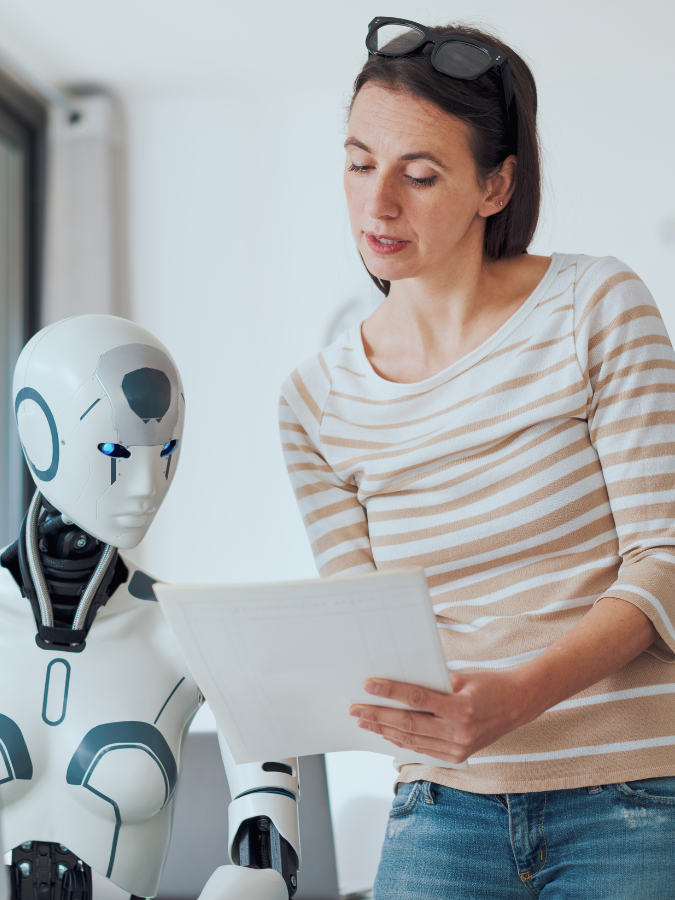It’s 2:14 AM. A lone founder is hunched over a desk, half-empty coffee cup beside them, browser tabs multiplying like gremlins. The idea won’t sleep, and neither will they. There’s a deck to polish, a landing page to draft, and three different business models they’re trying to make sense of.
Except this time, they’re not alone.
Beside them—quiet, invisible, but surprisingly helpful—is a partner that doesn’t ask for equity or health insurance. It’s suggesting better headlines for the pitch, rewriting that awkward email, and pulling competitor data in seconds. Not in a sci-fi way. In a right now, already happening kind of way.
Founders have always leaned on grit, caffeine, and a few good friends who believed in the vision. But now, they’re starting to lean on something else—smarter tech that doesn’t just assist, but actually builds alongside them. It’s not replacing the hustle. It’s reshaping it.
What if your co-founder wasn’t a person? What if it was something sharper, faster, always ready to pick up where you left off?
That’s what this shift is about. Not tech as a tool. Tech as a teammate.
The early hustle doesn’t have to be lonely
Every founder knows that stretch of time when it’s just you, your idea, and the uncomfortable silence of not knowing if any of it will work. The inbox is empty, your landing page has two visitors (one is your mom), and you’re staring at a list of to-dos that somehow grows even when you do nothing.
This is the part nobody glamorizes. The pre-seed, pre-hype, pre-anything phase. It’s you writing your own press releases just to feel like someone believes in it.
But now, there’s a new rhythm forming in the solo grind. Because while you’re figuring out your product name, AI is mocking up logo options. While you’re drafting that cold email, AI is tweaking the subject line for better open rates. While you’re brainstorming taglines, it’s suggesting ten that are actually good.
It’s subtle at first. Feels like a better autocomplete. Then it becomes more than that—it starts filling in the gaps you didn’t even realize were slowing you down. You’re not working faster just for speed’s sake. You’re working smarter because you’re not stuck in the weeds.
Founders have always worn too many hats. But for the first time, one of those hats can actually think. And that changes the early game entirely.
From decision fatigue to clear direction
Some days, being a founder feels like playing 20 games of chess at once—while blindfolded. You’ve got pricing models in one hand, product features in the other, and a dozen contradictory suggestions from well-meaning friends floating in your inbox.
The hard part isn’t making a decision. It’s making the right one when everything feels urgent.
This is where AI steps in—not to tell you what to do, but to help you breathe. You can feed it your pitch, your market assumptions, your wild what-ifs—and it won’t get overwhelmed. It will map out your blind spots, flag potential outcomes, and sort signal from noise.
Say you’ve got five ways to monetize. Instead of spinning your wheels or flipping a coin, you ask AI to break down the risks, weigh them against trends, and surface patterns you didn’t see. Suddenly, the fog clears.
It’s not about outsourcing your gut. It’s about reducing the mental clutter so your gut can finally speak up.
Decision fatigue isn’t a badge of honor. It’s a bottleneck. And this kind of tech is helping founders remove it, one question at a time.
Prototyping at the speed of thought
Founders used to sketch wireframes on napkins and wait weeks for a developer to bring them to life. Then they’d tweak the copy, adjust the flow, and go back to the devs with a dozen more requests—each one adding time, budget, and second-guessing.
Now? You can describe what’s in your head, and AI builds the first version before your coffee cools.
Need a landing page for your beta signups? Give it a few bullet points, and it spits out a layout with polished copy and design suggestions. Wondering how your app should onboard new users? Talk it out, and you’ll have user flow options in minutes. Testing tone of voice? Ask for playful, serious, or straight-up weird—see what clicks.
There’s no waiting room anymore. You’re iterating while the idea’s still hot. Which means less friction, faster feedback, and more freedom to chase what actually works instead of getting stuck building what you think might.
This isn’t about perfection. It’s about momentum. And in a world where startups win by learning faster, that’s a serious edge.
Talking to customers before you’ve built anything

Founders used to build first, pitch later. You’d spend months on a product, then scramble to find someone who actually wanted it. More often than not, the response was polite silence—or worse, confused silence.
Now you can flip the script.
Before writing a single line of code, you can test your messaging. Feed your product idea into AI, and it’ll generate potential customer objections, simulate feedback, even roleplay conversations from different buyer personas. It’s like hosting a mini focus group on demand—without scheduling calls or buying coffee.
You can experiment with different angles: What if you sell it as a time-saver instead of a money-saver? What if the value prop shifts from convenience to control? Instead of guessing what might resonate, you watch in real time what sticks and what falls flat.
The beauty of this setup is simple. You’re not locked into assumptions. You’re building conversations before building products. And that kind of clarity can save months of work—and thousands of dollars.
Rethinking your first hire
Ask any founder what their first hire was, and you’ll usually hear the same answers: a developer, a VA, maybe a scrappy marketing intern who did a little bit of everything.
But now, some founders are skipping that step entirely—and hiring AI instead.
Not as a gimmick. As a strategy.
Instead of bringing on a junior assistant to research blog topics, some founders have AI generating content outlines, refining copy, and even drafting social posts that sound human. Instead of hiring someone to organize pitch decks or compile investor lists, AI is handling that with hours to spare.
This doesn’t mean the team disappears. It just changes the order. That intern budget might now stretch across dozens of tasks handled instantly, giving founders more room to hire later—and hire smarter.
The key isn’t replacing people. It’s not needing people right away. When the basics are covered, you get to stay focused on what only you can do: shaping the vision, talking to customers, building real momentum.
Sometimes, your first real hire isn’t a person. It’s the extra bandwidth you didn’t think you could afford—until now.
The risks no one likes to talk about
It’s easy to get swept up. AI writes fast. It answers confidently. It rarely sleeps.
But just because it feels smart doesn’t mean it’s always right.
Founders who rely too heavily on AI can start skipping the hard questions. They stop checking sources. They trust outputs that confirm their hunches and overlook the subtle cues that come from real conversations. What starts as a helpful assistant can quietly become an echo chamber—one that talks back in your own voice.
There’s also the risk of overuse. When AI handles everything from brand tone to customer research, you can lose the messy, human edge that often sparks original thinking. That weird idea you almost dismissed? AI might clean it up before it ever gets the chance to shine.
This isn’t a call to unplug. It’s a reminder to stay awake.
The smartest founders don’t hand over the wheel. They treat AI like a copilot—one that’s fast, tireless, and sometimes wrong. They still ask real customers what they think. They still argue with their own assumptions. And they still trust that not every shortcut is worth taking.
Where we’re headed
Startups used to come with a familiar rhythm: founders bootstrapping in garages, scribbling ideas on whiteboards, burning through ramen and runway in equal measure. That story’s still alive—but there’s a new version emerging alongside it.
One where the first team member isn’t flesh and blood. One where experiments take hours instead of months. One where the founder isn’t alone at 2 AM, because something’s already scanning the docs, fixing the slide deck, and prepping tomorrow’s investor questions.
This doesn’t make the founder obsolete. It makes them sharper. Less buried in busywork. More focused on what actually matters.
Startups have always been about betting on speed, instinct, and adaptability. That hasn’t changed. What’s changing is who—or what—helps you move.
If you’re building something new, you’re not just choosing a tech stack. You’re choosing a partner. And for a growing number of founders, that partner doesn’t need a desk. Just a prompt.




